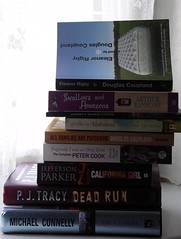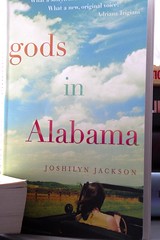Summer Reading Revisited - Page Turners and Slow Burners

summer books
Originally uploaded by mcmrbt.
As (sort of) usual, I badly underestimated my summer reading requirements. I figured, what with having my guitar for company, I'd not have the endless empty hours to fill that I usually have. But I did. This, in spite of an hour or so guitar practice every day, and in spite of scanning and photoshopping 150 or so old photographs from my wife's family's albums and taking 800 or so other photographs on various family outings.
Time: and lots of it, which is what having a holiday is really all about. It helps that, staying at the in-laws, I cooked just one meal (a stir fry, to demonstrate wok cooking) in the two weeks and really didn't have to do any of those household chores, so I really did have lots and lots of time available.
So my small pile of books, consisting of the latest Michael Connelly (The Closers) and the latest PJ Tracy (Dead Run), a single issue of Asimov's Science Fiction Magazine, and (a late addition, donated by Andrew) Tragically I was an Only Twin: The Complete Peter Cook; my small pile was inadequate. The two thrillers disappeared within three days (see separate review), and I ploughed through the Peter Cook for the remainder of the week, not really enjoying it, because it's more the sort of book you dip into on the loo or something. I'd taken Swallows and Amazons with me to read to the kids, so I privately fast-forwarded through that, too. I made the Asimov's last until the second Sunday evening by forcing myself to put it down and do something else at the end of each story (and I cursed the fact that I'd left two further unread issues at home, in spite of thinking vaguely for months that I would take them on holiday with me and do them justice).
Monday of the second week, we went on a trip to Strasbourg, and I had it in my mind that, in such an international city, a University town to boot, I'd find a bookshop with some fiction étrangers. And so it proved. Remarkably, there was a damn good selection, and I picked 4 crackers to see me through the rest of the week: two by Douglas Coupland, All Families Are Psychotic, and Eleanor Rigby. Ones I hadn't read, though I always think I probably have, since all his books are so similar. Another thriller: California Girl by Jefferson Parker; and gods in Alabama by first-time novelist Joshilyn Jackson. Paid through the nose for them, natch, but not a Euro was wasted.
Proving what? That you can judge a book by its cover, I suppose. The Jackson cover looked a little bit too much like so-called "Women's Fiction," but the blurb on the back was more in the line of genre - it was a literary type of thriller: there's a body involved, but the narrative is chopped up and told half backwards and half forwards, like, y'know, art.
But it was still a cracking read, and a real page-turner. Not enough pages, unfortunately, and I devoured it completely in a single day. It's the story of a girl who promises God that she'll stop fornicating and lying, and never return to Alabama, if He'll just somehow spirit away the body of a High School quarterback she happens to have clouted with a heavy Tequila bottle on the top of a make-out hill when she was 15. Twelve years later, someone turns up looking for the missing quarterback, and everything starts to unravel.
Was four additional books enough? Just about. I saved Eleanor Rigby for the last day, the airport hours, and it was just enough: two weeks, 8 books, and an issue of Asimov's (a skimpy paperback collection of short stories). Given that I had to pace myself a bit, I'd estimate 10 books, or 8 and a couple extra Asimov's is really enough. Should make a note of that somewhere.
As for the Coupland. I always enjoy him, because he writes in the way I'd write, in my dreams, and he's a keen observer of the modern condition who creates pleasurable sentences that speak directly to me. Like this one:
'Life is boring. People are vengeful. Good things always end. We do so many things and we don't know why, and if we do find out why, it's decades later and knowing why doesn't matter any more.'

0 Comments:
Post a Comment
<< Home